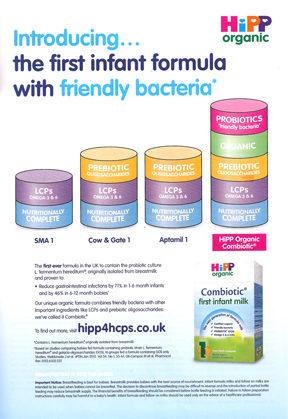Companies targeting health workers in the UK
Companies spend a fortune on promoting formula to the public and to health workers.
This promotion is highly misleading. For example, the advertisements in the same health worker journal below each claim the brand is closer to breastmilk than the others.
Click here to download a pdf file of the Campaign for Ethical Marketing action sheet.
Sign the "No promotion - Cheaper formula" petition at:
http://www.change.org/en-GB/petitions/baby-milk-companies-no-promotion-cheaper-formula
Recent estimates suggest that between about 50% and 80% of the selling price of formula goes towards company promotion and profits.
This means a mother using powdered formula during the first 12 months of her baby's life will contribute around £300 above the cost of the milk, processing and distribution towards the company's promotional budget and profit. This may rise to over £800 for a mother who uses more expensive ready-to-feed formula.
The above advertisements appeared in the July 2012 edition of Community Practioner, one of the few journals to still accept formula advertising in the UK.
Corporate takeover of health information services
Community Practioner journal also comes with the 'Feeding for Life' supplement (below left) sponsored by Danone and branded with its Cow & Gate infant formula name and heart. The Cow & Gate heart also appears on Danone's formula labels and online advertising (below right).


The Feeding for Life Foundation website directs health workers to Danone's In Practice website (see below) for "practical advice and insight for healthcare professionals".
Baby Milk Action has successfully brought complaints before the Advertising Standards Authority (ASA) about advertising to the public when companies have claimed their brand of formula is the 'best'. The claims do not stand up to scrutiny. All formulas on the UK market have to comply with composition requirements and include the ingredients known to be necessary for infant nutrition. Optional ingredients, often used as the basis of marketing campaigns, are of no proven benefit.
Unfortunately, the ASA refuses to investigate complaints about misleading advertising in health professional journals on the grounds that the editors are better placed to self-regulate. Clearly editors are failing in this regard as they focus on the money that advertising brings.
In June 2012, the British Journal of Midwifery ran an editorial from one of its editorial board entitled "Breast is best but choice is paramount", using the bogus argument that prohibiting advertising produced by companies somehow denies health workers information. Prohibiting advertising does not stop genuine peer-reviewed research appearing in journals.
There are independent sources of information available about formula and its use from academic and not-for-profit organisations. See, for example, Infant Milks in the UK: a Practical Guide for Health Professionals : Helen Crawley, S. Westland and Infant Formula Explained (DVD) produced by Baby Milk Action for the Baby Feeding Law Group.
Companies find new ways to push formula when independent information is defended
Many health authorities have stopped marketing representatives visiting health facilities, instead inviting representatives to provide information to a designated infant feeding expert or committee of experts for evaluation so that any necessary information can be communicated.
To circumvent this, companies try to sign up health workers directly to their own health worker "information services" and run and sponsor training events.
The premium on formula funds company sites and telephone lines offering to provide expert advice and resources as shown here. Danone has two apparently separate sites, one to promote the Aptamil brand of formula and the other Cow & Gate (shown below).

On its Aptamil Professional site, above, Danone promotes its Aptamil anti-reflux formula. On the Cow & Gate site it promotes its ready-to-feed bottles for hospital usage. "Expert advice" turns out to be a handy way to push products.

Wyeth offers study days, literature and resources for mums on its "Professional Know How" site. Again, these resources are part of a marketing campaign to push its SMA formula. The message it wants health workers to pass on: "SMA First Infant Milk : Drop for drop, we're closer to breast milk than any other formula."
Wyeth cannot substantiate this claim for its formula in advertising to the public - so why does it make it on its unregulated website?

Companies organise a programme of events, also branded with formula names and even award Professional Development Points if health workers attend.
Independent and academic study events may cost health workers more, but there is no such thing as a free lunch: parents who use formula each pay hundreds of pounds to fund these marketing strategies. Health workers also lose their independence when attending company events.
Nearly twenty years ago paeditricians in India decided it was unethical to accept baby food company sponsorship and decided it was better to pay for events themselves. It has since become law in India that baby food companies cannot organise or sponsor health worker events or education. The World Health Assembly has also adopted Resolutions on conflicts of interest in support to health workers and health programmes. If India can implement the Resolutions and ban companies using their marketing budgets in this way, then why not the UK?
Not for nothing are parents supporting Baby Milk Action's "No promotion - Cheaper formula" campaign.
Action you can take
If your health worker provides you with resources about infant feeding and care, ask where they came from. Are the materials funded by the premium charged on formula? If your health worker is using company materials, question why they think parents who use formula should be funding this when there are resources available through the NHS, UNICEF Baby Friendly, mother support groups and the not-for-profit sector.
Sign the "No promotion - Cheaper formula" petition at:
http://www.change.org/en-GB/petitions/baby-milk-companies-no-promotion-cheaper-formula
Report company promotion in the health care system to the Baby Feeding Law Group.
| Attachment | Size |
|---|---|
| Campaign for Ethical Marketing action sheet September 2012 | 2.73 MB |









